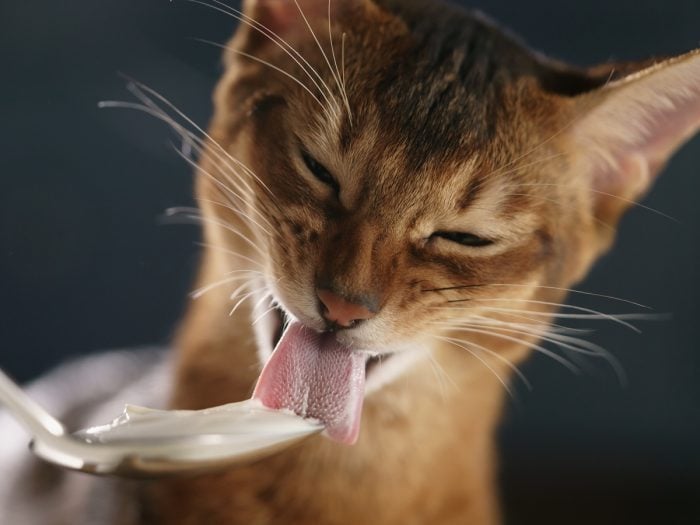There is some understandable worry from pet owners when cats eat yogurt, so before allowing your cherished pet to lick your spoon, learn the benefits and potential drawbacks of this probiotic treat.
Can Cats Eat Yogurt?
The benefits of yogurt in people are well known, but many wonder if they extend to cats as well. Many adult cats are lactose intolerant, but the fermentation process that creates yogurt actually breaks down the lactose, making it easier for cats to digest. Look for natural, full-fat yogurt with lots of good probiotics. Certain additions like vanilla, strawberry, or blueberry won’t harm your cat, but you may find that your feline companion simply doesn’t like them very much! However, cats cannot digest natural sugars, while artificial sweeteners – like those in many flavored yogurts – can be toxic to cats and should be avoided entirely. [1]

Can cats eat yogurt? Photo Credit: Shutterstock
Advantages of Yogurt
The probiotics that make yogurt such a superfood offer many benefits.
Improves digestion
If your cat suffers from digestive problems, a spoonful of yogurt can improve bowel function and help her regain her appetite.
Promotes bone health
Yogurt is packed with calcium for strong bones and teeth, and the dental benefits don’t stop there. [2]
Dental Care
Yogurt helps strengthen tooth enamel and balances the bacteria in the mouth that can lead to bad breath and poor gums.
Boosts immunity
Those wonderful probiotics can give cats an immune system boost and reduce symptoms of allergies as well.
Yogurt is especially good for kittens and can be used to make homemade kitten formula.
Side Effects
As with any human food, however, yogurt should only be given to your cat in moderation, as normal cat food should be sufficient for all nutrient needs. Cats can be allergic to yogurt, which can result in a number of unwanted side effects, including the following: [3]
- Vomiting
- Diarrhea
- Flatulence
- Bloating
- Stomach pain
